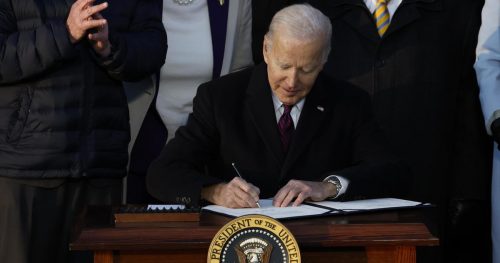

By Perla Brito and Ashton Yuan
WASHINGTON, DC – Nazgol Ghandnoosh, co-director of research at The Sentencing Project, and Bill Underwood, a senior fellow at The Sentencing Project, are charging Congress’s last session in 2022 “failed to pass any meaningful reform,” disappointing those in federal prisons and their loved ones.
Citing the Biden Plan for Strengthening America’s Commitment to Justice states, “We can and must reduce the number of people incarcerated in this country while also reducing crime,” Ghandnoosh and Underwood said the plan hasn’t worked.
They state that despite Joe Biden’s promise to cut the federal prison population by half, the number has been increasing for the past two years after being in decline for nearly a decade as a result of repeated failures, the Bureau of Prisons’ oppositional stance on utilizing compassionate release, and Biden not making enough use of executive clemency.
Both of them add Congress should aim to pass the EQUAL Act, the First Step Implementation Act, and the COVID-19 Safer Detention Act in 2023.
Bill Underwood served 33 years of a life sentence in federal prison before receiving compassionate release, while Nazgol Ghandnoosh has documented the growth and harms of lengthy prison sentences.
“We’ve lived and studied the dramatic rise in the federal prison population and we know the urgency of finding solutions,” said the authors, who said, “Federal prisons imprisoned 25,000 people in 1980. Today, they imprison more than six times that—nearly 160,000 people.”
According to The Sentencing Project, “The past decade of legislative reforms and policy changes, amplified during the early pandemic, have downsized federal prisons…the federal prison population has grown again for the past two years,” as Congress and administrations have not come out with “new reforms.
“The human toll of those failures is immense,” said Ghandnoosh and Underwood, noting, “Elderly people who should be spending their final years with their family continue to grow older behind bars,” and, “Children are growing up without parents who could have safely come home years ago.”
Tax money is spent on prisons instead of being spent on interventions that could help improve communities, claim the writers, adding, “And all of those burdens disproportionately fall on Black, Brown, and poor people.”
They also state that excessive sentencing is “counterproductive to protecting public safety,” explaining people in their 50s and 60s “pose a very low risk of committing a serious crime” which means reducing excessive sentencing would allow that money to be allocated into “much more effective investment in public safety.”
Senator Dick Durbin has said, “I’ve tried to undo some of the damage done [during] the war on drugs. We came together in 2010 to pass a bill I called the Fair Sentencing Act. It lowered the federal drug sentences for the first time since the war on drugs. Through bipartisan negotiations, we were able to significantly reduce the crack-powder sentencing disparity, but we didn’t eliminate it.”
However, the EQUAL Act introduced by Senator Dick Durbin and Senator Cory Booker “would end the infamous disparity between sentences for crack and powder cocaine,” said Ghandnoosh and Underwood. It would also allow those who were convicted for a federal offense involving crack or powder cocaine to receive a new sentencing under an updated law.
The authors said law enforcement, doctors, and criminologists all believe there is no reason to give people convicted of crack offenses a harsher punishment than those convicted of powder offenses. The bill was passed easily by the House.
Attorney General Merrick Garland sent out a memo Friday that instructed prosecutors to “[a]dvocate for a sentence consistent with the guidelines for powder cocaine rather than crack cocaine.”
The writers claim that Garland’s efforts to reduce disparities between sentences for crack and powder cocaine do not change the circumstances for people who are already incarcerated.
Ghandnoosh and Underwood said, “The First Step Implementation Act would make key provisions of the First Step Act retroactive. When it passed the First Step Act in 2018, Congress made clear that it considered some sentences too long and shortened them.”
They note this is why people sentenced prior to this law should also receive that relief. The bill would also allow courts to consider sentence reductions for people who committed crimes under the age of 18 and have served at least 20 years incarcerated.
“The First Step Act excludes the oldest people in federal prisons—those convicted prior to November 1, 1987—from applying to courts for compassionate release,” according to the writers.
They added “The COVID-19 Safer Detention Act would make them eligible, while also allowing elderly people who have served the majority of their sentence, and who the Bureau of Prisons deems low risk, to return to their families via the elderly home detention pilot program.”
The writers claim, “Collectively, these three bipartisan bills could allow thousands, including the oldest and sickest people in federal prisons, to return home to loved ones and communities. They would also eliminate costly, pointless incarceration that keeps people from entering the workforce and supporting their families.
“The path to bipartisan criminal justice reform is not simple, but it’s essential for justice and fairness,” said Ghandnoosh and Underwood, urging, “As Sens. Dick Durbin and Lindsey Graham and Reps. Jim Jordan and Jerry Nadler set Judiciary Committee priorities this session, sentencing reform must be at the top of the list.
“President Joe Biden should be leading the way by recommitting to his campaign promises of dramatically decreasing the federal prison population” and focusing on “redemption and rehabilitation” for the U.S. criminal justice system,” Ghandnoosh and Underwood stated.




